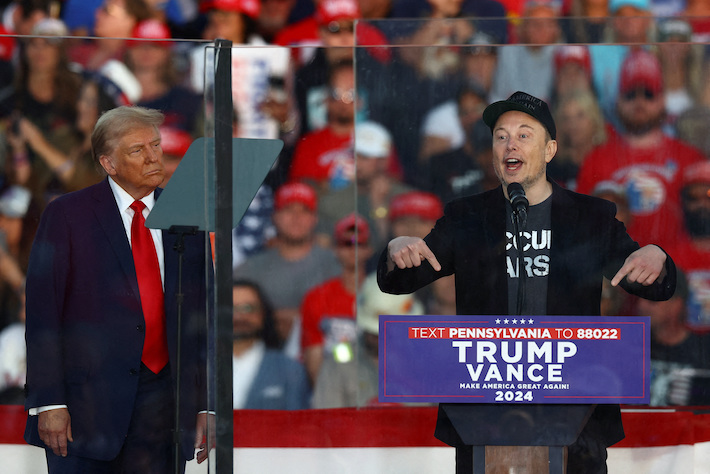Several members of US President Donald Trump’s inner circle have deep insights on China, but they differ greatly in how to deal with the country seen as America’s biggest rival.
Given the wide divergence of views between individuals such as businessman Elon Musk and his hawkish Secretary of State Marco Rubio, it is perhaps not surprising that Trump held off imposing tariffs on China on day one of his presidency, despite saying that tariffs would make the United States “rich as hell.”
Trump’s comments on his warm conversations with his Chinese counterpart Xi Jinping and comments from sources in the Republican administration suggest he is open to a new trade deal. And some analysts say Xi is desperate to deter large tariffs, which could seriously his weaken his already sluggish economy.
ALSO SEE: Xi Jinping Seen Luring Trump Into a New US-China Trade Deal
Here’s a look at Trump’s incoming cabinet picks and their stance on China:
Elon Musk
Musk, appointed by Trump to lead an advisory body aimed at creating a more efficient US government, has extensive business interests in China and spent years cultivating close ties with the Chinese leadership as Tesla’s CEO.
Although not a cabinet member, the South Africa-born billionaire could become a key middleman for dialogue between the Trump administration and Beijing, having met recently with China’s Vice Premier Han Zheng in Washington.
Tesla, which opened a Shanghai gigafactory in 2019, has received billions in subsidies, loans and tax breaks from the Chinese government, a rarity for foreign companies normally beset by Chinese regulatory and market access restrictions.
Despite that support, Musk’s other ventures, including commercial rocket and satellite firm SpaceX and social media platform X (banned in China), are viewed by Beijing as security risks.
His mother, Maye Musk, has modelled in advertisements for multiple Chinese brands and is an influencer on Chinese social media, claiming to visit the country “nearly every month”.
David Perdue
The former Georgia Republican Senator is Trump’s pick to become the next US ambassador to China, and previously lived in Hong Kong during his 40-year career as a business executive.
US Democrats have complained that in his business career, including at sporting goods company Reebok, Perdue relied on outsourcing American manufacturing jobs to Asia, a practice Trump has railed against and vowed to end.
Some Chinese analysts have expressed hope that Perdue’s Asia experience and pragmatic reputation could stabilise fraught US-China ties.
Still, while a senator from 2015 to 2021, Perdue criticised China on trade, human rights and defence issues, having accused Beijing of accelerating its military buildup and causing the loss of US manufacturing jobs. He later supported Trump’s tariffs on over $300 billion of Chinese goods.
Howard Lutnick
Trump’s Commerce Secretary pick is the CEO of Wall Street brokerage firm Cantor Fitzgerald and an outspoken advocate of tariffs.
However, his firms’ exposure to China has come under sharp scrutiny. One of his firms, BCG Group, has a Chinese joint venture with state-owned China Credit Trust, while Cantor Fitzgerald, with offices in Hong Kong, underwrote Chinese biotech firm Adlai Nortye’s Nasdaq IPO in 2023.
Lutnick’s financial ties to China raise questions over whether he would be unduly influenced by Beijing while overseeing a broad swathe of US export controls against China, including over sensitive US technologies that Washington fears Beijing could use for military purposes, say critics.
He has said he would step down from his positions at Cantor and BCG if confirmed.
Mike Waltz
The incoming National Security Adviser and US Army Special Forces veteran has long been hawkish on China, having pushed for the US to boycott the 2022 Beijing Winter Olympics over alleged Chinese human rights violations including in Xinjiang.
He vowed earlier this month to continue bolstering US regional security alliances as part of Washington’s Indo-Pacific strategy, as well as continued US arms sales to Taiwan.
But this week, Waltz appeared to show some room for compromise, as he did not rule out continued Chinese ownership of TikTok coupled with “firewalls to make sure that the data is protected here on US soil.”
TikTok resumed its services on Sunday after Trump said he would “save” access for its 170 million American users, despite a law banning the Chinese-owned app’s continued operation over data security concerns.
Marco Rubio
One of the most vocal China hawks in the Senate, the newly confirmed Secretary of State was sanctioned twice by Beijing in 2020 over his criticism of China over alleged human rights abuses in Xinjiang and China’s crackdown in Hong Kong.
It is unclear whether Beijing will lift the sanctions, which ban Rubio from travelling to China, once he is in office.
He co-sponsored the 2021 Uyghur Forced Labor Prevention Act, which effectively bans most imports from Xinjiang. More recently, he described Beijing as the “biggest threat” to American security, warning against China’s dominance of global supply chains.
- Reuters with additional editing by Jim Pollard
ALSO SEE:
Trump Says He And China’s Xi Will Likely ‘Get Along Very Well’
Trump Planning to Clamp Down on Chinese EV Supply Chains
China Seen Taking on More Debt to Counter Trump Tariffs
China Central Bank ‘to Allow a Weaker Yuan’ as Trade Risk
Chinese Media to Trump: ‘There Are No Winners in Tariff Wars’
China ‘Keen For Talks on Trade Deal to Reduce Tariffs Threat’
Economists Say Trump Won’t Hit China With 60% Tariffs Early On
US Adds 30 More China Firms to Uyghur Forced Labour Blacklist
























